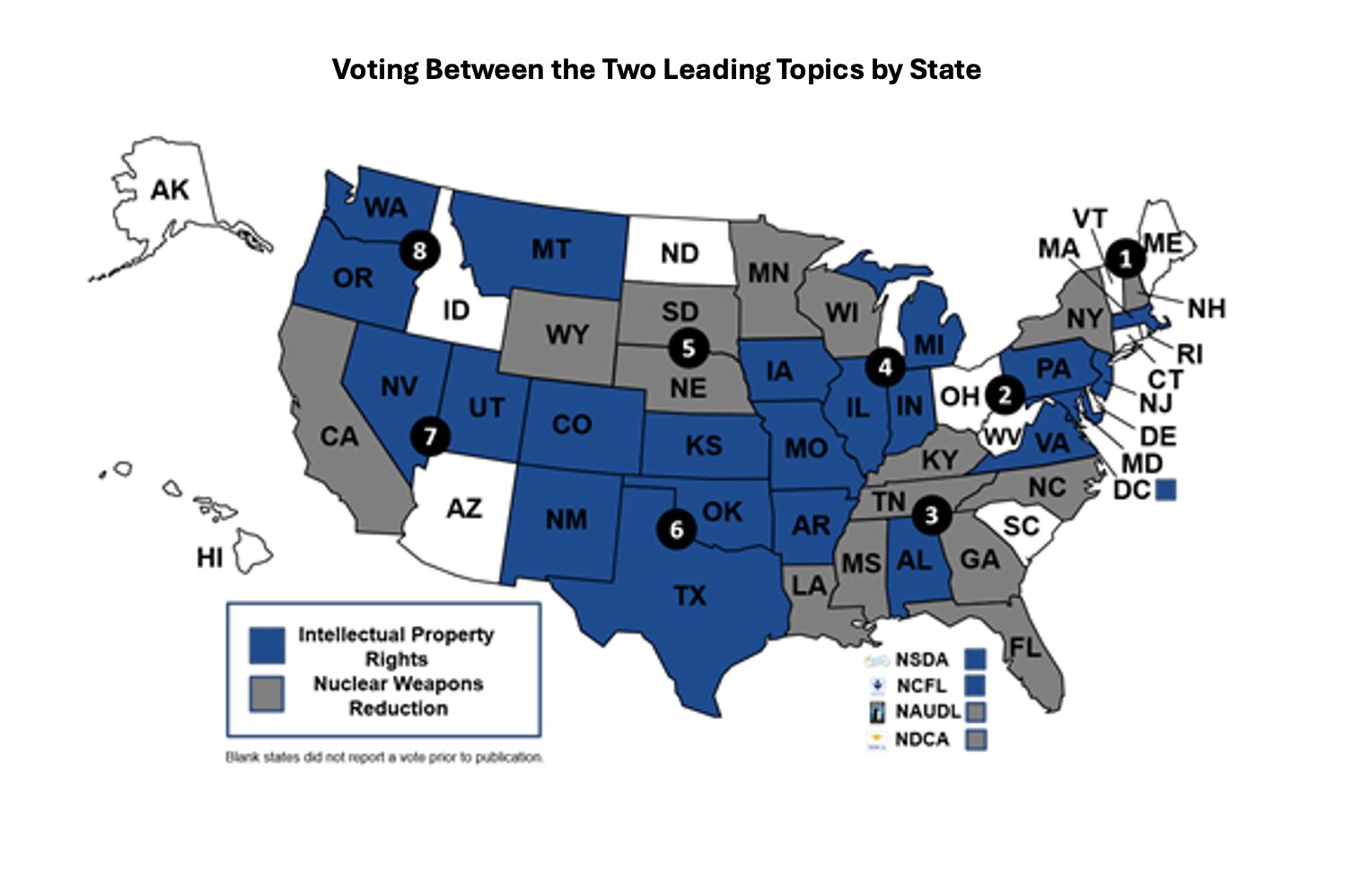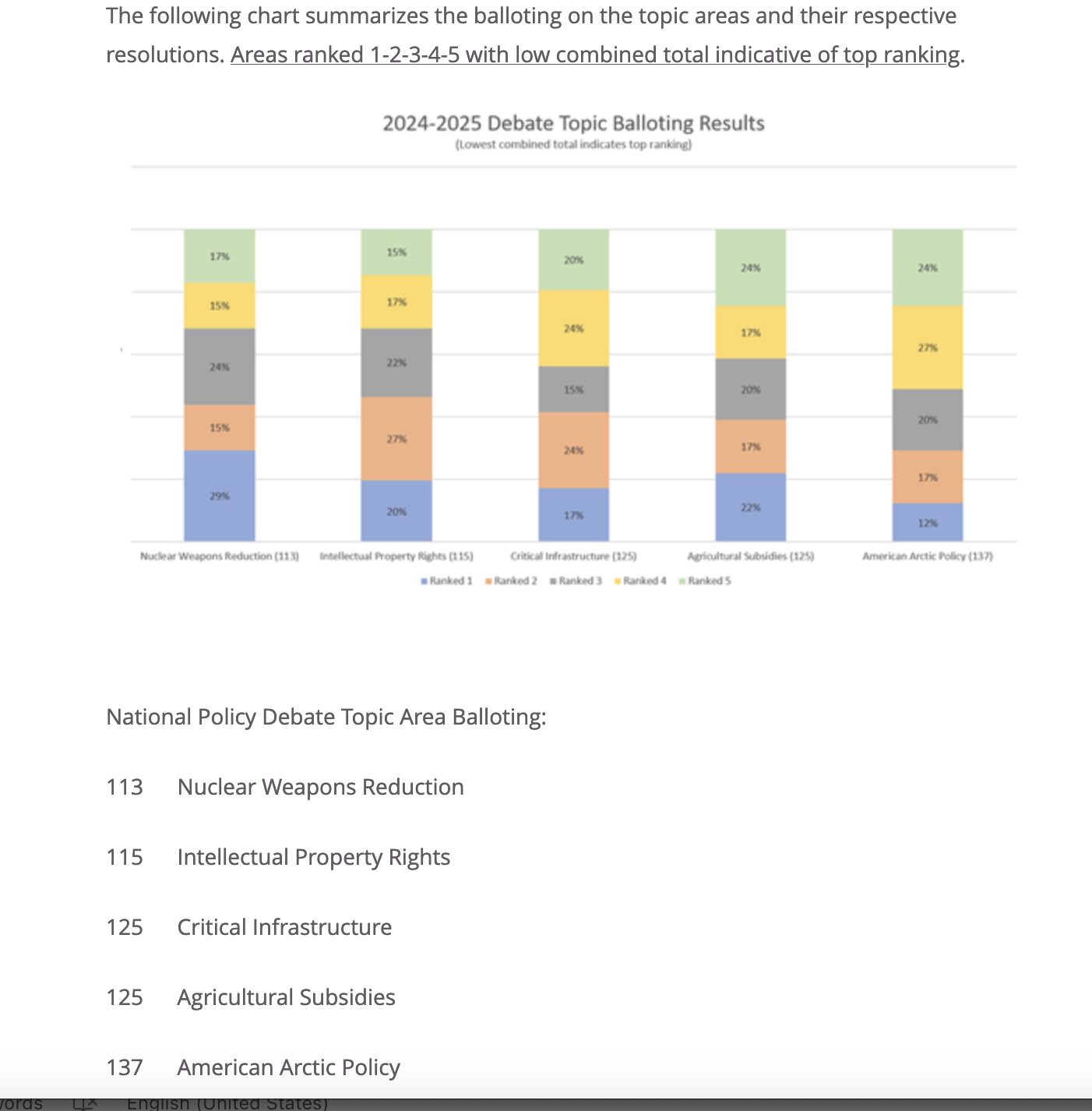“Resolved: The United States federal government should significantly strengthen its protection of domestic intellectual property rights in copyrights, patents, and/or trademarks.” – NFHS 2024-2025 policy debate topic
 After a year-long process involving 38 state organizations and dozens of individual representatives, IP rights has been selected as the topic for the 2024-2025 debate competition by The National Federation of State High School Associations (NFHS).
After a year-long process involving 38 state organizations and dozens of individual representatives, IP rights has been selected as the topic for the 2024-2025 debate competition by The National Federation of State High School Associations (NFHS).
“Should the U.S. strengthen intellectual property rights” was chosen over “Nuclear Weapons Reduction” by a 25-17 vote in the final balloting process. In addition to NHFS and state debate associations, those who helped to determine the outcome included the National Speech and Debate Association, the National Catholic Forensic League, the National Association for Urban Debate Leagues and the Nation Debate Coaches Association.
The declaration of IP as the focus for the prestigious national competition is music to the ears of IP organizations and creators, which have long encouraged wider awareness of the purpose and impact of IP rights and campaigned for more student exposure. More than 7,000 students participate in the annual completion.
The topic could not be timelier. It asks debaters: “Should the United States federal government significantly strengthen its protection of domestic intellectual property rights in copyrights, patents, and/or trademarks?”
“This is a clear indication that innovators and creators are succeeding in changing the public narrative about the role of IP rights in innovation economies and flourishing societies,” said Adam Mossoff, Professor of Law at Antonin Scalia School of Law at George Mason University and a member of the board of directors of the Center for Intellectual Property Understanding (CIPU).
“I competed in debate when I was in high school,” continued Professor Mossoff, an innovation policy expert. “It’s an excellent way for students to learn evidence-based advocacy as opposed to the name-calling and junk science that have dominated discussions about IP. There is overwhelming evidence that IP rights are a launch pad for growing innovation economies and creative cultures.”
Never Before
“This is a first-time topic for the national high school debate competition,” Dr. James Weaver, an NFHS executive told CIPU. “IP is a growing area of interest to creators, businesses and society. It’s being fueled by the volume of digital rights and complexity of ownership and will play an increasing role in future careers.”
Another factor, Dr. Weaver suggests, may have been the timeliness of artificial intelligence. With generative AI models “scraping” data from diverse public sources they do not own or license, copyright has come under attack. Disputes over written and audio content, as well as likeness and images, reflected in the 171-day Screen Actors Guild strike and the Writers Guild walk-out, illustrate the seriousness of the issues. Dr. Weaver is President of the National Music Council, a forum for the discussion of national music affairs comprised of more than 50 organizations.

Source: https://www.nfhs.org/articles/intellectual-property-rights-selected-as-2024-2025-national-policy-debate-topic/
IP rights are no longer a back-burner legal issue for big companies and legal specialists. They are a topic of national importance. Equipping more students with an understanding of the strengths and weaknesses of patents, copyrights, trademarks and trade secrets serves to improve quality and value and create jobs.
Fueling greater interest in IP rights are the explosion of inventions and creative expression worldwide, an increase in infringement and a rash of questionable IP filings from businesses and universities based in China. They affect both business and consumers. Lack of certainty about IP rights because of new technologies, greater volume and foreign competition have also been a factor.
The World Trade Organization (WTO) and others’ support of compulsory licensing rights for patents, inspired in part by the COVID-19 pandemic, is an illustration of the damaging misinformation which can lead to diminished investment capital and innovation centered on a handful of companies that fear disruption and are valued more for their market capitalization and existing product line than their invention prowess.
What good IP behavior looks like for a business or consumer remains a mystery. Lawful IP behavior is not necessarily ethical behavior. It leans towards increasing shareholder value, but at what cost? Unethical IP behavior erodes the certainty of IP rights and quality of innovation, discourages competition and has a negative impact on quality of inventions and content, as well as the people who create them.
Sixty-one delegates from 25 states attended the NFHS Policy Debate Topic Selection Meeting August 4-6, 2023, in Portland, Oregon. Sixteen topic reports were presented by authors who, for the past 12 months, researched each topic area. State delegates and participants deliberated for three days to determine the final five topic areas: Agricultural Subsidies, American Arctic Policy, Critical Infrastructure, Intellectual Property Rights, and Nuclear Weapons Reduction. IP rights were selected. The National Speech and Debate Association (NSDA) will provide the infrastructure for the debates.
In January, ballots from 38 states and several national organizations were received and tabulated for the 2024-2025 national high school policy debate topic. There was a total of 42 state/organizations that participated. The returned ballots narrowed the five proposed topics to two for placement on the final ballot to select the 2024-2025 topic (see graph).

Source: https://www.nfhs.org/articles/intellectual-property-rights-and-nuclear-weapons-reduction-are-the-final-choices-for-the-2024-2025-national-debate-topic/
NFHS’ IP Topic Summary
PROBLEM AREA IV: INTELLECTUAL PROPERTY RIGHTS
Resolved: The United States federal government should significantly strengthen its protection of domestic intellectual property rights in copyrights, patents, and/or trademarks.
The importance of intellectual property rights stretches across all areas of American life from the technology we use, to the pharmaceutical drugs we rely on, to the entertainment that we enjoy. Not only has the protection of intellectual property rights (IPR) been a part of United States innovation policy since the country was founded, but to see its relevance in our own day-to-day lives we only need to look at the rise of AI created art, soaring drug prices, or impending release of 1989—Taylor’s version. There is not a single good or service that we enjoy in our daily lives that is not in some way, shape, or form affected by the protection of IPR.
The proposed resolution asks affirmative teams to strengthen IPR in one or more of the three main areas of US IP law: copyrights, patents, or trademarks. This resolution represents a departure from the past two decades of status quo policy that will generate a diverse and deep array of affirmative advantage areas including: technology, climate change, pharmaceutical drugs, computing/artificial intelligence, art/music, economy, etc.. Potential affirmative cases include legislative, judicial, and executive actions such as legislating changes to the patent application process and either overturning or legislatively overruling key court cases. Likewise, the topic also allows for numerous conversations over the ways in which various minority groups in the United States have not been able to protect their creations and knowledge due to a lack of strong IP protections by taking actions to strengthen groups and individuals ability to protect their original works and knowledge.
Negative teams will be well served by this topic and have numerous options and strategies to generate clash with affirmative cases, because IP protections are generally applied broadly across all industries, affirmative changes to the system will have downstream effects on a wide variety of industries. There will be robust case debate supported by an incredibly deep literature base of authors who disagree with the stated effects of a strong patent system. There are not only several core topic disadvantages, but affirmative cases will also generate specific disadvantages based on the plan mechanism or target area. The negative will have a large and interesting set of counterplans including actor counterplans, regulation/reform counterplans, and counterplans that set out to abolish patents altogether. Additionally, there is no shortage of kritik ground on the topic as there are a wide variety of literature bases that are critical of United States IP regimes and IP as a concept.
For an activity that attracts such a large number of students who have at least a partial interest in future legal careers, we as a community have rarely ever debated explicitly legal topics despite high interest and unique educational opportunities of exploring new literature bases. Additionally, IPR has never been a policy topic despite its centrality and importance to our lives. Debates on this topic will be accessible to novices who all can intuitively understand the need to protect original works and inventions while also having a deep enough literature base to keep even the most advanced debaters interested and engaged throughout the competitive season.
Information Sources
Debaters are typically encouraged to conduct original research in support of their position. For students today that means extensive use of Google Search, which has inherent IP biases, as does generative AI, such as ChatGPT. The NFHS is putting together a resource packet called “The Policy Debate Quarterly,” a four-volume series that breaks down the national topic primarily authored by Dr. Richard Edwards, a professor of communications at Baylor University. It will be available to schools starting in May 2024.
It will be interesting to see what information the Quarterly provides in support of stronger intellectual property rights, or not, and how it is presented to students, many of whom will be unacquainted with IP rights.
For students and others who want a fast, fair and quick overview of IP rights and how they operate, CIPU has created IPBasics.org, an essential IP information portal. IPBasics.org provides background, curated by a multi-disciplinary team of IP, business, invention and content industry professionals. The website is a beginning, not an end. It enables users to readily access noteworthy parts of other sources, such as U.S. Patent and Trademark Office and World Intellectual Property Office content.
The selection of IP rights to debate competitively among thousands of high school students is a big step in the right direction. Supporters of IP certainty and judicial fairness will be eager to see how it is interpreted and which debaters’ arguments resonate loudest.

![[IPWatchdog Logo]](https://ipwatchdog.com/wp-content/themes/IPWatchdog%20-%202023/assets/images/temp/logo-small@2x.png)

![[Advertisement]](https://ipwatchdog.com/wp-content/uploads/2024/04/UnitedLex-May-2-2024-sidebar-700x500-1.jpg)
![[Advertisement]](https://ipwatchdog.com/wp-content/uploads/2024/04/Artificial-Intelligence-2024-REPLAY-sidebar-700x500-corrected.jpg)
![[Advertisement]](https://ipwatchdog.com/wp-content/uploads/2024/04/Patent-Litigation-Masters-2024-sidebar-700x500-1.jpg)

![[Advertisement]](https://ipwatchdog.com/wp-content/uploads/2021/12/WEBINAR-336-x-280-px.png)
![[Advertisement]](https://ipwatchdog.com/wp-content/uploads/2021/12/2021-Patent-Practice-on-Demand-recorded-Feb-2021-336-x-280.jpg)
![[Advertisement]](https://ipwatchdog.com/wp-content/uploads/2021/12/Ad-4-The-Invent-Patent-System™.png)






Join the Discussion
2 comments so far. Add my comment.
Pro Say
March 25, 2024 08:43 pmBravo! (Though by the time these bright young lads and ladies are in the decisional driver’s seat, it’ll likely be far too late to restore America’s formally world-leading, gold standard patent system.)
With the U.S. left scrounging for any innovation scraps left behind by Communist China and the rest of the world.
Scott Moskowitz
March 25, 2024 01:49 pmBlast from the past. The topics during my high school years: harmonizing criminal justice; approaches to increasing employment; and, improving water quality. Happy to see IP Rights as this year’s resolution …
Add Comment